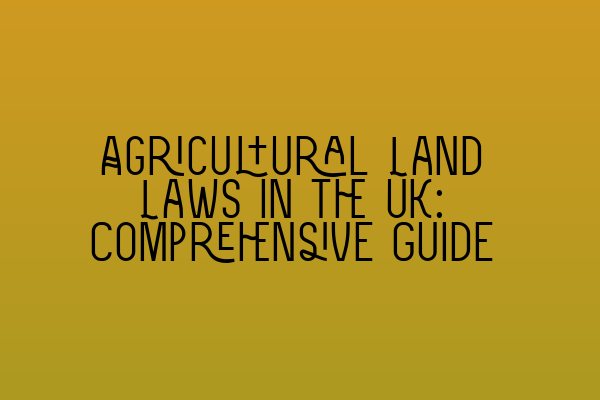Agricultural Land Laws in the UK: Comprehensive Guide
Welcome to SQE Property Law & Land Law, your trusted solicitors specializing in agricultural land laws in the UK. In this comprehensive guide, we will provide you with all the essential information you need to know about agricultural land laws in the country.
Understanding Agricultural Land Laws
Agricultural land laws in the UK are a complex yet vital aspect of property law. They govern the ownership, use, and transfer of farmland and aim to protect agricultural interests, promote sustainable farming practices, and ensure the continuity of the agricultural sector. Whether you are a farmer, landowner, or someone interested in investing in agricultural land, it is crucial to have a clear understanding of these laws to navigate the legal landscape effectively.
Key Legislation
In the UK, several key pieces of legislation shape agricultural land laws, including:
- Agricultural Holdings Act 1986: This Act outlines the rights and responsibilities of tenants and landlords of agricultural holdings, including provisions related to rent, succession, and dispute resolution.
- Town and Country Planning Act 1990: This Act regulates the use and development of land, including planning permissions for agricultural activities and buildings.
- Wildlife and Countryside Act 1981: This Act protects important wildlife habitats and species, including those found on agricultural land, and imposes restrictions on certain activities such as hedgerow removal and pesticide use.
Tenancy Agreements
Tenancy agreements play a significant role in agricultural land laws in the UK. The most common types of agricultural tenancies are:
- Agricultural Holdings: Covered by the Agricultural Holdings Act 1986, these tenancies provide significant security of tenure to the tenant, allowing them to pass on their tenancy to a family member in certain circumstances.
- Farm Business: Governed by the Agricultural Tenancies Act 1995, these tenancies are more flexible and allow landlords and tenants to negotiate terms based on their specific requirements.
It is crucial for both landlords and tenants to seek legal advice to ensure that their rights and obligations are protected when entering into a tenancy agreement. Our team of expert solicitors at SQE Property Law & Land Law can provide the guidance and support you need.
Environmental Considerations
Environmental considerations are an integral part of agricultural land laws. The UK government has implemented various schemes and regulations to encourage sustainable farming practices, protect the environment, and support biodiversity. These include the Countryside Stewardship Scheme and the Basic Payment Scheme. Understanding and complying with these environmental requirements is essential for agricultural landowners and farmers.
Buying and Selling Agricultural Land
Buying or selling agricultural land involves various legal considerations. It is crucial to conduct thorough due diligence, assess planning permissions and restrictions, and understand any existing tenancy agreements and agricultural subsidies. Working with experienced solicitors like SQE Property Law & Land Law ensures that all legal requirements are met and protects your interests throughout the transaction.
Contact SQE Property Law & Land Law
At SQE Property Law & Land Law, we have a team of highly skilled solicitors with expertise in agricultural land laws. Our comprehensive knowledge of the subject allows us to provide top-notch legal services tailored to your specific needs. Whether you require assistance with a tenancy agreement, environmental compliance, or property transactions, we are here to help.
Contact us today to schedule a consultation and discuss how we can assist you in navigating agricultural land laws in the UK.
Related Articles:
- SQE 1 Practice Exam Questions
- SQE 1 Practice Mocks FLK1 FLK2
- SQE 2 Preparation Courses
- SQE 1 Preparation Courses
- SRA SQE Exam Dates
